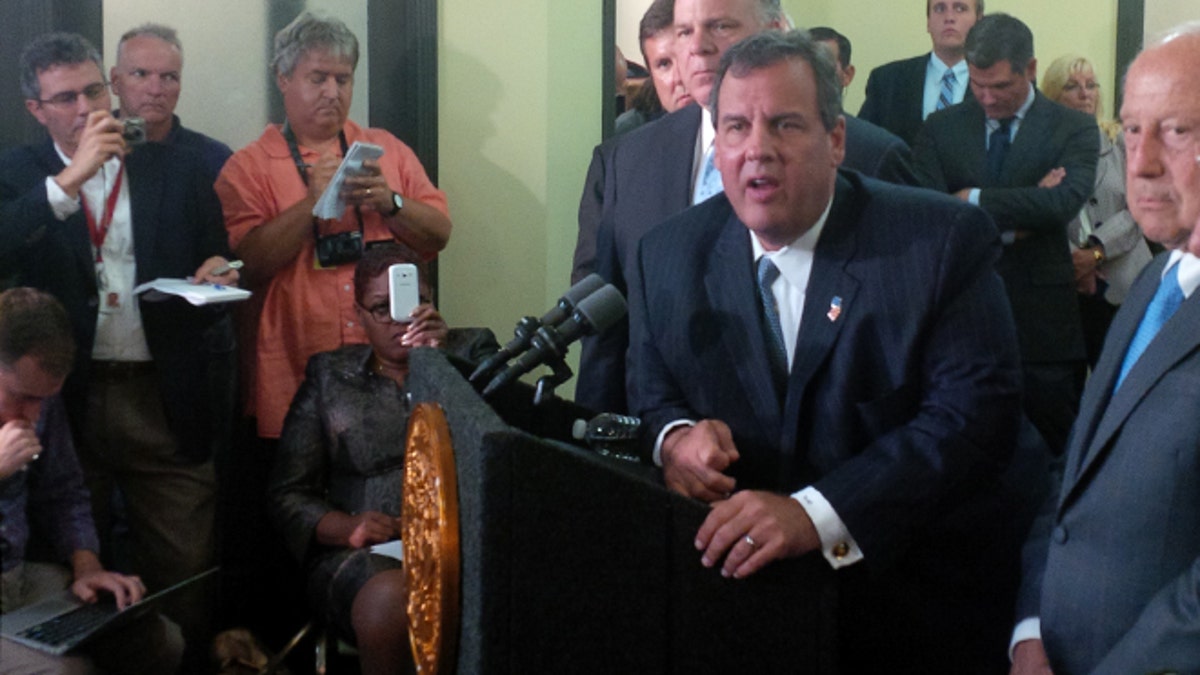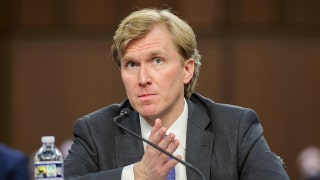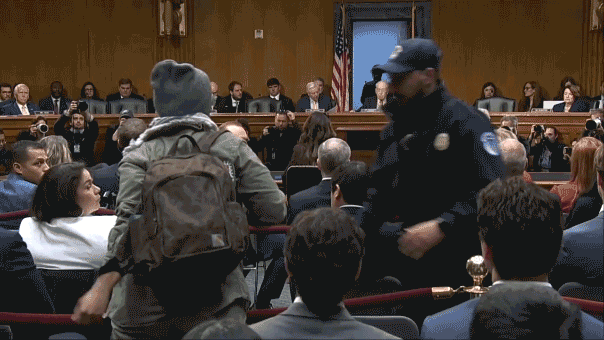
Sept. 8, 2014: New Jersey Gov. Chris Christie talks after a summit in Atlantic City, N.J., on how to help the resort after casino closings.
ATLANTIC CITY, N.J. – Just days after two major casino-hotels closed, New Jersey Gov. Chris Christie came to this iconic seaside resort Monday to huddle with lawmakers and top executives about how to once again reinvent Atlantic City and save it from economic despair.
Christie, a potential 2016 GOP presidential candidate, called for the summit in mid-August after a brutal couple of weeks in which the Showboat, the Revel Casino Hotel and the Trump Plaza each announced plans to close.
But the closed-door meeting Monday took on a heightened sense of urgency as Christie faces his second high-profile crisis of the past 12 months. The decline of Atlantic City threatens to dent his economic record, and potentially his political prospects, with roughly 8,000 casino jobs expected to be gone by next week.
"It's difficult for any governor going into an election and not being able to say something like 'I created more jobs than any other governor in state history,'" Democratic strategist and Fox News contributor Joe Trippi said, predicting the city's troubles will be ready "fodder for his detractors."
Christie, though, true to character, is trying to project a confident image as he tackles the Atlantic City heartache head-on. “There are reasons for hope now,” Christie said after emerging from the two-hour meeting with participants including General Assembly leaders, Atlantic City Mayor Don Guardian and Tropicana chief executive Tony Rodio.
“Of course that’s cold comfort for those who lost their jobs,” the governor continued. “We have a crisis.”
The second-term governor declined to discuss possible solutions, saying only that “everything is on the table,” amid speculation of a state takeover. The group will reconvene in mid-October.
Christie spoke as New Jersey Democrats and Democratic National Committee Chairwoman Debbie Wasserman Schultz were in Fort Lee, N.J., to mark the one-year anniversary of “Bridgegate.” Democrats have tried, so far unsuccessfully, to link Christie directly to the political scandal in which a staffer and political appointees conspired to create gridlock in Fort Lee by closing toll lanes at the George Washington Bridge -- allegedly because the mayor didn’t support Christie’s reelection bid.
Their relentless efforts nevertheless have hurt Christie’s political cachet.
On Monday, Christie dismissed the anniversary event as “nakedly partisan” and said it makes clear Bridgegate was a politically motived controversy. “I love it when the chairwoman of the DNC comes and proves my point,” the governor said.
Tyler Harber, a Republican strategist and partner at the Washington, D.C.-based communications firm Harden Global, on Tuesday called Bridgegate “old news” that likely won't hurt Christie’s chances in a GOP presidential primary. “And he's one of the few who could conceivably beat Hillary Clinton in the general election,” Harber said.
The stalled Atlantic City revival, though, poses a different kind of challenge for Christie. The Showboat and the two-year-old Revel closed after the Labor Day weekend, taking with them an estimated 5,000 jobs. And last week, state regulators gave Trump Plaza owners the OK to close on Sept. 16, a day after hosting the Miss America Pageant, eliminating roughly 1,100 more jobs.
With the closing of the Atlantic Club Casino Hotel in January, the city has lost four of its 12 casino-hotels so far this year, amid several published reports that the Taj Mahal could be next.
Critics are heaping much of the blame on Christie, who upon taking office in 2010 began a five-year revitalization effort for the resort and its casino-dependent economy.
In 2012, he called the opening of the $2.4 billion Revel a “turning point” in Atlantic City’s comeback and his five-year plan to revitalize the hard-on-its-luck resort destination.
But on Monday, Christie was trying to explain why he supported the opening of the Revel, including a tax-break incentive, while also saying its closure and the others were “inevitable” in the face of years of increased competition from other states.
“We’ve seen this coming for some time,” he said. “The fact of the matter is gambling is now legal in 40 states.”
To be sure, casino openings in recent years in Connecticut, Delaware, Maryland, New York and Pennsylvania ended Atlantic City’s roughly 36-year run as the East Coast’s gambling mecca.
As a result, the resort’s casino revenue fell from $5.2 billion in 2006, after the first Pennsylvania casino opened, to $2.86 billion last year.
Still, industry experts essentially agree that the Atlantic City closings were indeed a market correction.
"Governor Christie and his team need to stay focused on New Jersey, not the 2016 Republican primary," said David Payne, a Republican strategist and vice president of Washington, D.C.-based Vox Media. "And if they do, it will help the governor remain viable for the 2016 race. ... New Jersey is more than Atlantic City. It has a large economy. Don't count Christie out yet."
Christie and others, including the New Jersey Casino and Redevelopment Authority, have repeatedly pointed out that non-gaming revenue in Atlantic City is increasing and that the resort must now focus on the development and redevelopment of waterfront projects while promoting its beaches, boardwalk and shopping.
The authority said Monday that non-gaming revenue in Atlantic County from 2010 to 2013 increased by $240 million -- from $4.72 billion to $4.96 billion.
Just hours before Christie spoke, his administration announced the lifting of a ban on sports betting at New Jersey casinos and racetracks, based on a recent federal ruling and despite the governor’s earlier opposition. However, Christie insisted the move was “not timed for today” and said the decision was made by the state’s Attorney General’s Office.
Christie and others clearly saw the downturn coming.
In November 2013, officials allowed Internet gambling, which created some jobs but not nearly enough to cover the casino closures. And earlier this year, they managed to get United Airlines to fly directly into the resort from hub cities Chicago and Houston.
Atlantic City has a long, storied history of economic ups-and-downs -- from its 1920 glory days when sprawling boardwalk hotels like the Ritz-Carlton offered guests cool ocean breezes and a haven for Prohibition-era drinking and gambling.
However, the resort began a long, slow decline after World War II that eventually ended in the mid-1980s when a series of championship boxing bouts -- like Mike Tyson vs. Michael Spinks -- helped lure investors, high-rollers and others back to the resort. But the money never trickled deep into the southern New Jersey economy, as hoped.












































